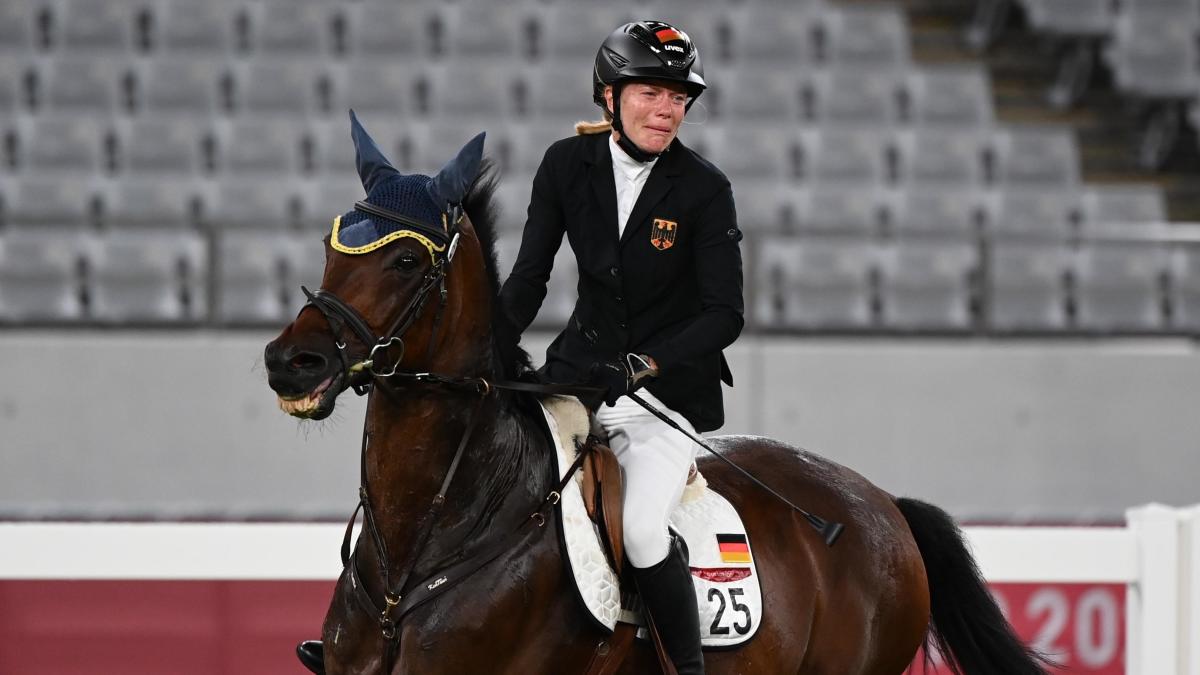Saint Boy’s rebellion spurs debate about ethical treatment of horses at the Olympics — and beyond

As the glitter and dust of the Tokyo Olympic games settle, one controversy doesn’t just have legs, it has four legs. This is largely due to an ugly scene in the modern pentathlon, an intense event in which human athletes fence, swim, shoot, run and ride a horse all in the same day.
During the pentathlon, a horse named Saint Boy — ridden by German athlete Annika Schleu — refused to jump multiple obstacles. This resulted in Schleu having a very public meltdown, and German coach Kim Raisner being disqualified after she was caught on camera punching the horse. The incident generated so much international attention that actress and horsewoman Kaley Cuoco offered to buy Saint Boy.
Saint Boy, who normally lives and works at the Minakuchi Riding Club in Japan, certainly made his views crystal clear on that day in Tokyo. He did not want to participate, no interpretation or detailed horse knowledge needed. Was he an athlete feeling stress and discomfort? A worker withdrawing his labour? A sentient being saying no? As a researcher of animal protection and labour, I’d say all three.
Competitive events
In modern pentathlon events, the humans and horses only meet each other right before the class starts. The horses are borrowed for the event, normally from a local farm. The horse-rider pairs have a short warm up, and then the competition begins. This is highly unusual.
In the trio of primary equestrian sports at the Olympics — dressage, eventing and show jumping — the horse and human pairs normally train together for many months, more often years. While horses intended for jumping learn to understand a consistent set of commands and aids, the animals are all different. They have personalities and preferences. Horses are not machines. You cannot simply hop onto one and expect to perform challenging tasks in tandem instantaneously.
Horses are unique individuals
Horses’ moods, comfort levels and physical well-being change over time, and in immediate response to a host of factors, including the rider, their particular style and their level of anxiety — even the weather.
In an Instagram post, Malin Baryard-Johnsson, a member of the gold medal-winning Swedish show jumping team, wrote about her equine partner Indiana. Baryard-Johnsson says that it took “a couple of years of learning to understand each other” and speaks about Indiana as an individual and as a whole being who is “friendly, funny, crazy, positive, sensitive, energetic …”
Horses are not a uniform group, and neither are horse people. Far from it. There are many subcultures and industries engaging with horses in starkly different ways. Racing has little in common with equine-assisted therapy and pleasure riding, for example.
Plus within each equine culture there are distinct philosophies, methods and ethical priorities, all of which affect the horses’ experiences. From their stabling conditions, including their ability to see and touch other horses, to their feed to their time outdoors (or not) to the length of horses’ careers and what happens to them afterwards — all of these factors affect the animals’ work-lives in a full sense, and differ substantially.
Crucial debates
There were other equestrian concerns stemming from the Olympics, including about the new structure of the team show jumping and its implications for horse welfare.
A horse named Jet Set was euthanized after an injury in the eventing competition in Tokyo. When you involve other species, the risks and very real effects of our choices are heightened.
Horses hold complex positions in our laws, lives and hearts. Whether it is Thoroughbred racing or horse-drawn carriages in tourist centres, when it comes to horse controversies, people tend to split into three camps.
There is always a group that believes the status quo is acceptable and that the horses are fine. These people might support some minor tinkering with equipment or welfare regulations, but insist that the horses are well cared for overall.
The second and largest group is generally comfortable with horses doing some work and sport with humans as long as it is respectful but will still have concerns about specific practices and horses’ well-being before, during or after the job in question. This group may want to see modest or even major reforms, and some activities eliminated altogether because they are deemed too unethical or risky for the horses.
The third group argues that people’s use of horses’ labour is unethical, period, and that horses should be freed from human tasks as a matter of principle.
These debates are not tidy and are unlikely to be resolved soon. But robust, well-informed reflection is critically important. One thing is clear — people love horses. Yet we disagree about what it really means to love horses.
Horses are not a uniform group, and neither are horse people. Far from it. There are many subcultures and industries engaging with horses in starkly different ways. Racing has little in common with equine-assisted therapy and pleasure riding, for example.
Plus within each equine culture there are distinct philosophies, methods and ethical priorities, all of which affect the horses’ experiences. From their stabling conditions, including their ability to see and touch other horses, to their feed to their time outdoors (or not) to the length of horses’ careers and what happens to them afterwards — all of these factors affect the animals’ work-lives in a full sense, and differ substantially.
Crucial debates
There were other equestrian concerns stemming from the Olympics, including about the new structure of the team show jumping and its implications for horse welfare.
A horse named Jet Set was euthanized after an injury in the eventing competition in Tokyo. When you involve other species, the risks and very real effects of our choices are heightened.
Horses hold complex positions in our laws, lives and hearts. Whether it is Thoroughbred racing or horse-drawn carriages in tourist centres, when it comes to horse controversies, people tend to split into three camps.
There is always a group that believes the status quo is acceptable and that the horses are fine. These people might support some minor tinkering with equipment or welfare regulations, but insist that the horses are well cared for overall.
The second and largest group is generally comfortable with horses doing some work and sport with humans as long as it is respectful but will still have concerns about specific practices and horses’ well-being before, during or after the job in question. This group may want to see modest or even major reforms, and some activities eliminated altogether because they are deemed too unethical or risky for the horses.
The third group argues that people’s use of horses’ labour is unethical, period, and that horses should be freed from human tasks as a matter of principle.
These debates are not tidy and are unlikely to be resolved soon. But robust, well-informed reflection is critically important. One thing is clear — people love horses. Yet we disagree about what it really means to love horses.
This article was originally posted on Saint Boy’s rebellion spurs debate about ethical treatment of horses at the Olympics — and beyond



